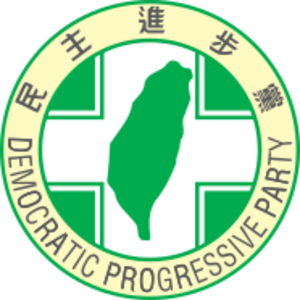Democratic Progressive Party facts for kids
Quick facts for kids
Democratic Progressive Party
民主進步黨
|
|
|---|---|
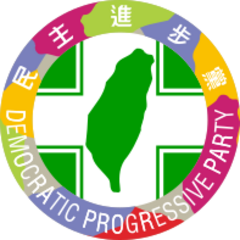 |
|
| Abbreviation | DPP |
| Chairperson | Lai Ching-te |
| Secretary-General | Yang Yi-shan (acting) |
| Founded | 28 September 1986 |
| Split from | Tangwai |
| Headquarters | 10F-30, Beiping East Rd. Zhongzheng District, Taipei, Taiwan 10049 |
| Think tank | New Frontier Foundation |
| Membership (2023) | |
| Ideology |
|
| Political position | Centre to centre-left |
| National affiliation | Pan-Green Coalition |
| Regional affiliation | Council of Asian Liberals and Democrats |
| International affiliation | Liberal International |
| Colors | Green |
| Legislative Yuan |
51 / 113
|
| Municipal mayors |
2 / 6
|
| Magistrates/mayors |
3 / 16
|
| Councilors |
277 / 910
|
| Township/city mayors |
40 / 204
|
| Party flag | |
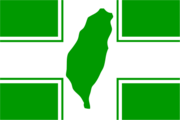 |
|
|
^ A: Taiwan independence is written in the DPP platform, but main DPP politicians support Huadu (ROC independence) position. ^ B: The DPP has also been characterized as centrist on an international political spectrum because of its historical positioning as the major big tent opposition party supporting democracy. It is also sometimes described as right-wing by pro-China or pro-communism media outlets owing to its anti-communism. |
|
| Democratic Progressive Party | |||||||||||||||||||||||||||||
|---|---|---|---|---|---|---|---|---|---|---|---|---|---|---|---|---|---|---|---|---|---|---|---|---|---|---|---|---|---|
| Traditional Chinese | 民主進步黨 | ||||||||||||||||||||||||||||
| Simplified Chinese | 民主进步党 | ||||||||||||||||||||||||||||
|
|||||||||||||||||||||||||||||
| DPP | |||||||||||||||||||||||||||||
| Traditional Chinese | 民進黨 | ||||||||||||||||||||||||||||
| Simplified Chinese | 民进党 | ||||||||||||||||||||||||||||
|
|||||||||||||||||||||||||||||
The Democratic Progressive Party (DPP) is a major political party in Taiwan. It supports Taiwanese nationalism, which means it believes Taiwan is its own country. The DPP is seen as a centre to centre-left party.
Right now, the DPP is the main ruling party in Taiwan. It controls the presidency and the central government. It is also the most important party in the Pan-Green Coalition.
The DPP was started in 1986 by Hsu Hsin-liang, Hsieh Tsung-min, and Lin Shui-chuan. This was just a year before martial law ended in Taiwan. The DPP is one of two major parties in Taiwan. The other is the Kuomintang (KMT), which used to rule Taiwan as a one-party state.
The DPP has always strongly supported human rights. It grew out of a time called the White Terror, when the KMT was very strict. The party also works to promote Taiwanese nationalism and a unique Taiwanese identity. Lai Ching-te is the current leader (chairperson) of the DPP since 2023. He is also the current President of Taiwan. He is the third person from the DPP to become president.
The DPP is part of international groups like Liberal International and the Council of Asian Liberals and Democrats. It used to represent Taiwan in the Unrepresented Nations and Peoples Organization (UNPO). The DPP is often called socially liberal. This is because it was founded to support human rights. Some parts of the party even support same-sex marriage and other LGBT rights.
When it comes to foreign policy, the DPP wants to spend more on defense. This is to protect Taiwan from military threats from the People's Republic of China (PRC). The party wants closer ties with democratic countries like Japan and the United States. It also seeks stronger relationships with nations in ASEAN through its New Southbound Policy. The PRC government often says the DPP tries to stop China from reuniting. They also say the DPP prevents China's "national rejuvenation." This is because the DPP strongly supports Taiwanese nationalism. It also believes Taiwanese people should decide their own future. The DPP is firmly against the idea of "One China" and the "1992 Consensus" that China and the KMT talk about.
Contents
History of the DPP
The DPP started from the Tangwai movement. This group was against the Kuomintang's authoritarian rule. The KMT had a "party-state" system during martial law. The DPP was officially formed on September 28, 1986. It was still illegal at the time. Eighteen people organized the party at the Grand Hotel Taipei. A total of 132 people joined.
In the 1986 election, the new party members ran as "nonpartisan" candidates. This was because other parties were still illegal. Early members of the DPP were often family members or lawyers of political prisoners. They were also intellectuals and artists who had lived abroad. These people strongly wanted political change. They fought for democracy and freedom of speech, press, assembly, and association.
The Tangwai movement was not fully united. It had different groups, and these groups carried over into the early DPP. When the DPP was founded, it had three main groups:
- The Kang group, a moderate group led by Kang Ning-hsiang.
- The New Tide faction, made up of intellectuals and activists like Wu Nai-ren and Chiou I-jen.
- The Progress Faction, led by Lin Cheng-chieh, who was against independence.
Later, moderate members formed the Formosa faction. These were people arrested during the Formosa Incident who were released from prison. In the early days, the Formosa faction focused on winning elections. The New Tide faction focused on ideas and building support for social movements. This made the Formosa faction more moderate, while New Tide became more focused on its beliefs. By 1988, the Formosa Faction held many important positions in the party.
At first, the DPP did not openly support an independent Taiwanese identity. Some moderates, like Hsu Hsin-liang, worried this could lead to a harsh response from the KMT. They also worried it might make voters turn away. Some members, like Lin Cheng-chieh, even supported unification with China.
Between 1988 and 1991, the New Tide Faction pushed for Taiwan's independence. They were helped by pro-independence activists returning from overseas. In 1991, to keep the New Tide in check, party chairman Hsu Hsin-liang agreed to add language to the party's rules. This language supported writing a new constitution and declaring a new Republic of Taiwan through a public vote. This caused many members who supported unification to leave the party.
However, the party soon changed its mind about this language. In 1999, the party passed a resolution. It stated that Taiwan was already an independent country, officially called "Republic of China." It also said that any changes to the constitution should be approved by the people through a vote. The resolution also stressed using the name "Taiwan" in international settings.
Even though the DPP didn't win many elections at first, its pressure on the KMT was very important. Many people believe the DPP helped bring about political reforms in the 1990s. These reforms included the direct popular election of Taiwan's president. They also allowed open discussions about past events like the February 28 Incident and the long period of martial law. This created more space for different political views. Once the DPP had members in the Legislative Yuan (Taiwan's parliament), they used it to challenge the KMT.
After Taiwan became more democratic, the DPP focused on fighting corruption. They especially looked into the KMT's links to organized crime. They also investigated "party assets" that the KMT had gained illegally during martial law. Different groups continued to form within the DPP. For example, future President Chen Shui-bian formed the Justice Alliance faction.
DPP as the Ruling Party (2000–2008)
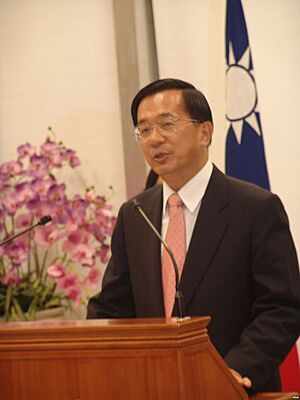
The DPP won the presidency in March 2000 with the election of Chen Shui-bian. This ended 91 years of KMT rule. Chen made the party's stance on independence softer. This was to appeal to moderate voters, please the United States, and calm China. He also promised not to change Taiwan's symbols or declare formal independence if China did not attack Taiwan. He also supported economic trade and transportation links with China.
In 2002, the DPP became the first party other than the KMT to have the most seats in the Legislative Yuan. This happened after the 2001 legislative election. However, the KMT, People First Party, and New Party formed a group that had more than half the seats. This stopped the DPP from fully controlling the parliament. This group often disagreed with President Chen. This led President Chen to move away from the moderate ideas he campaigned on.
In 2003, Chen announced a plan to create a law for public votes (referendums) and a new constitution. This appealed to the strong independence supporters in the DPP. By this time, the New Tide faction had become more practical in their approach to independence. They held many important decision-making roles in the party. Chen's plans for a referendum on a new constitution were stopped by the parliament. But he did manage to include a symbolic referendum about China's military threat. This happened at the same time as the 2004 presidential election. President Chen Shui-bian was re-elected by a small margin in 2004. This was after an attempted attack the day before the election. In the later legislative election, the KMT-led opposition still controlled the parliament.
President Chen's actions caused a debate within the party. Some members worried that voters would leave the party. But the strong independence supporters won the debate. As a result, the DPP largely followed Chen's lead. The DPP lost many elections in local and county elections in December 2005. The KMT-led group won 16 of 23 county and city government offices. This was under the leadership of popular Taipei mayor and KMT leader Ma Ying-jeou. Moderate members of the DPP blamed this loss on the party's strong independence stance.
These results led to changes in the party's leadership. Su Tseng-chang resigned as DPP chairman. Vice President Annette Lu became the acting leader. Yu Shyi-kun was then elected chairman in 2006.
In 2005, after China passed the Anti-Secession Law, Chen's government made a statement. It said that Taiwan's future should only be decided by the people of Taiwan.
Taiwan's Separate Identity
On September 30, 2007, the DPP passed a resolution. It said that Taiwan has a separate identity from China. It also called for a new constitution for a "normal nation." The resolution was flexible. It supported using "Taiwan" as the country's name generally. But it did not say to get rid of the name Republic of China.
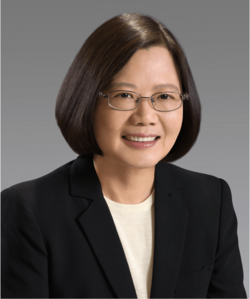
DPP Returns to Opposition (2008–2016)
In the national elections in early 2008, the DPP won less than 25% of the seats in the Legislative Yuan. Their presidential candidate, former Kaohsiung mayor Frank Hsieh, lost to KMT candidate Ma Ying-jeou by a large margin. In May, the DPP elected moderate Tsai Ing-wen as their new leader. She became the first female leader of the DPP and the first female leader of a major party in Taiwan.
The first few months back in opposition were focused on news about Chen Shui-bian. On August 15, 2008, Chen resigned from the DPP. He apologized, saying he had "let everyone down" and caused "irreparable damage to the party." DPP Chairperson Tsai Ing-wen said the party respected his decision.
The DPP promised to think about why the public was unhappy with the party. Chairperson Tsai stressed that the party needed to remember its history. She said it must defend the Republic of China's independence and security.
The party became a strong voice in Taiwan's politics again after Ma's government had been in power for a year. The DPP held large rallies in Taipei and Kaohsiung. At a rally on May 17, Tsai Ing-wen called for a "citizens' movement to protect Republic of China." She said it was to "protect our democracy and protect Republic of China."
DPP as the Majority Government (2016–2024)
On January 16, 2016, Taiwan held a general election for its presidency and for the Legislative Yuan. The DPP won the presidency with the election of Tsai Ing-wen. She received 56.12% of the votes. Her opponent Eric Chu got 31.2%. Also, the DPP won a majority of seats in the Legislative Yuan. They won 68 seats out of 113. This was up from 40 seats in the 2012 election. It was the first time the DPP had a majority in parliament.
President Tsai won re-election in the 2020 Taiwanese presidential election on January 11, 2020. The Democratic Progressive Party also kept its majority in the parliament, winning 61 seats.
DPP Returns to Minority Government (2024–present)
The presidential election and legislative elections on January 13, 2024, led to the election of Lai Ching-te. He won with 40.1% of the votes. His opponents were Hou Yu-ih of the KMT (33.5%) and Ko Wen-je of the Taiwan People's Party (26.5%). This election made the DPP the first party to win three presidential terms in a row since direct elections started in 1996. However, the DPP lost its majority in the Legislative Yuan, losing ten seats.
DPP's Ideas and Policies
The DPP is a centre to centre-left party. It is generally described as progressive. It has also been called liberal and social democratic. The party supports Taiwanese nationalism, which means it wants to make Taiwanese identity stronger.
The DPP supports moderate social welfare policies. These policies help women, senior citizens, children, young people, workers, minorities, indigenous peoples, farmers, and other groups in society. Its platform also includes:
- A legal and political system based on human rights and democracy.
- Good economic and financial management.
- Fair social welfare.
- Education and cultural reform.
- An independent defense and peaceful foreign policy.
- Closer ties with the United States and Japan.
The party is socially liberal. Under Tsai Ing-wen's leadership, it has supported gender equality and same-sex marriage. It also has some conservative supporters, including from the Presbyterian Church in Taiwan.
Views on Taiwan's Independence
A main political issue in Taiwan is whether Taiwan should be independent or unite with China. While these ideas seem very different, both major political groups have developed complex positions. The practical differences can sometimes be small.
The DPP's current official position is that Taiwan is an independent and sovereign country. Its land includes Taiwan and its smaller islands. Taiwan's independence comes only from its citizens living there. This is based on the 1999 "Resolution on Taiwan's Future". The DPP believes Taiwan is already an independent nation called the Republic of China. So, a formal declaration of independence is not needed.
Even though the party's rules in 1991 called for a new constitution and a Republic of Taiwan, the 1999 resolution has mostly replaced these earlier ideas. The DPP rejects the "One China principle" as defined in the 1992 Consensus. It believes this principle should not be the basis for official relations with China. The DPP supports a Taiwanese national identity that is separate from mainland China.
In contrast, the KMT (or pan-blue coalition) agrees that the Republic of China is independent. It also agrees that it is not part of the PRC. However, the KMT argues that a "one China principle" (with different meanings on each side of the strait) can be used for talks with China. The KMT also opposes Taiwan independence. It believes that trying to create a Taiwanese identity separate from a Chinese identity is unnecessary and causes problems. Some KMT officials have called the DPP's efforts "anti-China." This refers to opposing people who moved from mainland China, whom some DPP officials did not see as Taiwanese.
When the DPP first became the ruling party, some critics said it was too focused on Taiwanese nationalism. They said it didn't pay enough attention to the different ethnic groups in Taiwan. They argued that the KMT had been too focused on Chinese culture. They worried the DPP might only focus on Hoklo culture. The DPP argues that its efforts to promote a Taiwanese national identity are simply trying to make Taiwan's identity normal. This identity was suppressed during the KMT's authoritarian rule.
Support for the DPP
Since Taiwan became more democratic in the 1990s, the DPP has been strongest in areas where people speak Taiwanese Hokkien. This is different from areas where people mostly speak Hakka and Mandarin. These areas tend to support the Kuomintang.
There has been a long-standing tension between Taiwanese aborigines and Hoklo people. The KMT also has strong connections within aboriginal communities. These factors make aboriginal people often hesitant about the DPP. They tend to vote for the KMT. Aboriginal people have criticized politicians for using the "indigenization" movement for political gain. For example, some aboriginal groups opposed the DPP's recognition of the Truku group. In 2008, most mountain townships voted for Ma Ying-jeou. However, the DPP's share of the aboriginal vote has been growing.
How the DPP is Organized
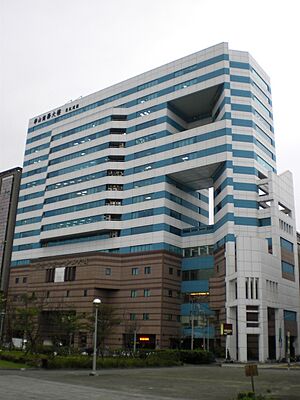
The DPP's National Party Congress chooses 30 members for the Central Executive Committee. It also chooses 11 members for the Central Review Committee. These members serve for two years. The Central Executive Committee then picks 10 members for the Central Standing Committee. Since 2012, the DPP has had a "China Affairs Committee." This committee deals with Cross-Strait relations (relations with mainland China). The name of this committee caused some debate. Critics suggested names like "Mainland Affairs Committee" or "Cross-Strait Affairs Committee." They felt these names would show a less hostile attitude.
Groups within the Party
For many years, the DPP officially recognized several groups (factions) within its members. These included:
- The New Tide faction (新潮流系)
- The Formosa faction (美麗島系)
- The Justice Alliance faction (正義連線系)
- The Welfare State Alliance faction (福利國系)
Different groups supported slightly different policies. They often represented people who joined the party at different times. In 2006, the party stopped officially recognizing these groups. The groups said they would follow this rule. However, these groups are still mentioned by name in the news.
As of 2022, Taiwan News identified at least 7 groups within the party:
- New Tide faction - William Lai, Chen Chu, Tsai Chi-chang, Chiu Tai-san, Pan Men-an, Lai Pin-yu
- TNCPA - Lin Chia-lung, Fifi Chen Ting-fei, Lin You-chang
- Green Fellowship Association - Ho Chih-wei
- Taiwan Forward - Lin Kun-hai, Hsu Kuo-yung
- Su Faction - Su Tseng-chang
- Ing Faction - Tsai Ing-wen, Chen Ming-wen, Kuan Bi-ling
- Democracy Living Water Connection - Cho Jung-tai, Luo Wen-jia, Lin Fei-fan
Party Leaders
- Current Chairperson: Lai Ching-te
Secretary-General
- Current Secretary-General: Lin Hsi-yao (since May 2020)
Leader in Parliament
- Shih Ming-teh (February 1, 1993 – February 1, 2002)
- Ker Chien-ming (since February 1, 2002)
Election Results
Presidential Elections
| Election | Candidate | Running mate | Total votes | Share of votes | Outcome |
|---|---|---|---|---|---|
| 1996 | Peng Ming-min | Frank Hsieh Chang-ting | 2,274,586 | 21.13% | Lost |
| 2000 | Chen Shui-bian | Annette Lu Hsiu-lien | 4,977,737 | 39.30% | Won |
| 2004 | 6,446,900 | 50.11% | Won | ||
| 2008 | Frank Hsieh Chang-ting | Su Tseng-chang | 5,445,239 | 41.55% | Lost |
| 2012 | Tsai Ing-wen | Su Jia-chyuan | 6,093,578 | 45.63% | Lost |
| 2016 | Chen Chien-jen ( |
6,894,744 | 56.12% | Won | |
| 2020 | Lai Ching‑te | 8,170,231 | 57.13% | Won | |
| 2024 | Lai Ching-te | Hsiao Bi-khim | 5,586,019 | 40.05% | Won |
Legislative Elections
| Election | Total seats won | Total votes | Share of votes | Changes | Party leader | Status | President |
|---|---|---|---|---|---|---|---|
| 1989 |
21 / 130
|
Huang Hsin-chieh | Minority | Lee Teng-hui |
|||
| 1992 |
51 / 161
|
2,944,195 | 31.0% | Hsu Hsin-liang | Minority | ||
| 1995 |
54 / 164
|
3,132,156 | 33.2% | Shih Ming-teh | Minority | ||
| 1998 |
70 / 225
|
2,966,834 | 29.6% | Lin Yi-hsiung | Minority | ||
| 2001 |
87 / 225
|
3,447,740 | 36.6% | Chen Shui-bian | Minority | Chen Shui-bian | |
| 2004 |
89 / 225
|
3,471,429 | 37.9% | Minority | |||
| 2008 |
27 / 113
|
3,775,352 | 38.2% | Minority | Ma Ying-jeou |
||
| 2012 |
40 / 113
|
4,556,526 | 34.6% | Tsai Ing-wen | Minority | ||
| 2016 |
68 / 113
|
5,370,953 | 44.1% | Majority | Tsai Ing-wen | ||
| 2020 |
61 / 113
|
4,811,241 | 33.98% | Cho Jung-tai | Majority | ||
| 2024 |
51 / 113
|
4,981,060 | 36.16% | Lai Ching-te | Minority | Lai Ching-te |
Local Elections
| Election | Magistrates and mayors | Councillors | Township/city mayors | Township/city council representatives | Village chiefs | Party leader |
|---|---|---|---|---|---|---|
| 1994 provincial |
1 / 3
|
52 / 175
|
N/A | N/A | N/A | Shih Ming-teh |
| 1997–1998 |
12 / 23
|
114 / 886
|
28 / 319
|
N/A | N/A | Hsu Hsin-liang |
| 1998 municipal |
1 / 2
|
28 / 96
|
N/A | N/A | N/A | Lin Yi-hsiung |
| 2001–2002 |
9 / 23
|
147 / 897
|
28 / 319
|
N/A | N/A | Chen Shui-bian |
| 2002 municipal |
1 / 2
|
31 / 96
|
N/A | N/A | N/A | |
| 2005 |
6 / 23
|
192 / 901
|
35 / 319
|
N/A | N/A | |
| 2006 municipal |
1 / 2
|
33 / 96
|
N/A | N/A | N/A | |
| 2009 |
4 / 17
|
128 / 587
|
34 / 211
|
N/A | N/A | Tsai Ing-wen |
| 2010 municipal |
2 / 5
|
130 / 314
|
N/A | N/A |
220 / 3,757
|
|
| 2014 unified |
13 / 22
|
291 / 906
|
54 / 204
|
194 / 2,137
|
390 / 7,836
|
|
| 2018 unified |
6 / 22
|
238 / 912
|
40 / 204
|
151 / 2,148
|
285 / 7,744
|
|
| 2022 unified |
5 / 22
|
277 / 910
|
35 / 204
|
123 / 2,139
|
226 / 7,748
|
National Assembly Elections
| Election | Total seats won | Total votes | Share of votes | Changes | Party leader | Status | President |
|---|---|---|---|---|---|---|---|
| 1991 |
66 / 325
|
2,036,271 | 23.3% | Huang Shin-chieh | Minority | Lee Teng-hui |
|
| 1996 |
127 / 334
|
3,121,423 | 29.9% | Shih Ming-teh | Minority | ||
| 2005 |
127 / 300
|
1,647,791 | 42.52% | Annette Lu Hsiu-lien | Plurality | Chen Shui-bian |
See also
 In Spanish: Partido Progresista Democrático (República de China) para niños
In Spanish: Partido Progresista Democrático (República de China) para niños
- Progressivism in Taiwan
- Human rights in Taiwan
- Taiwan Value
- Culture of Taiwan
- Taiwan independence movement
- Taiwan the Formosa
- Taiwan consensus
- Taiwanese people
- Resolution on Taiwan's Future
- Referendums in Taiwan
- Foreign relations of Taiwan
- February 28 Incident
- Formosa Incident
- Sunflower Student Movement
 | Janet Taylor Pickett |
 | Synthia Saint James |
 | Howardena Pindell |
 | Faith Ringgold |


